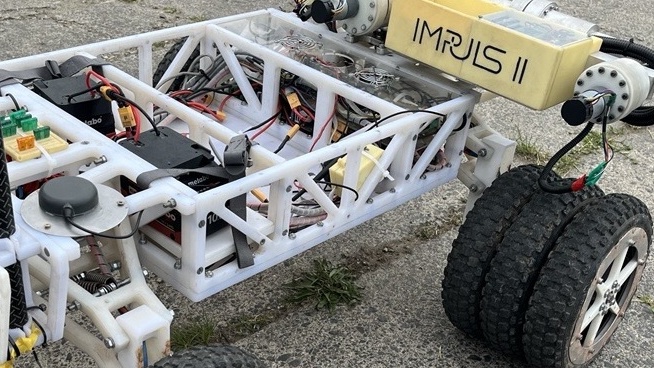French Touch, a team of innovators and military personnel from France, won first place on 15 May at the European Defence Innovation Days’ first ‘Makeathon,’ a competition for unmanned ground vehicles. The winners were awarded €10,000 in prize money.
The competition, organised by the European Defence Agency (EDA) with support from the Polish Ministry of Defence, was structured to include a spending cap of €25,000 and a weight limit of 75kg on each robot’s development. The competition aims to foster cooperation, cross-border knowledge sharing and to cultivate a mindset of continuous innovation.
The Makeathon focused on three main tasks: logistics, object recognition, and chemical, biological, radiological and nuclear (CBRN) sample collection. Judges tested the teams on their technical performance and autonomy around a course set out in a field next to the European Defence Innovation Days’ exhibition centre in Krakow, Poland. Points were awarded based on task completion. Tasks included monitoring a simulated gas leak and testing water quality, and correctly identifying military targets.
"You built machines, yes. But you also built bridges between military and civilian worlds," said Nathalie Guichard, EDA's Director of Research, Technology and Innovation, as she presented the prize.
French Touch developed a robot over two months using in-house design and manufacturing. Like all of the teams, the ground vehicle included a robotic arm, sensors and a camera for AI recognition. The team, which included members from French military AI specialists AMIAD, French procurement agency DGA, and the navy and air force, built the system from scratch. They used CNC-machined aluminium parts for the red, white, and blue robot, weighing under 50 kg. It was powered by four 1,000-watt motors and used for block delivery and water pH analysis.
Poland’s Impuls team came second with a 38 kg rover made from polyamide composites. Built by students from the Kielce University of Technology, the robot used cameras and AI for semi-autonomous operation. The team focused on improving coordination and machine control.

Third place went to another Polish team, the Legendary Rover Team, affiliated with Rzeszow University of Technology. Known for participating in Mars rover contests, the team upgraded its previous design with a new manipulator arm, wheel system and an electric drive.
Dutch team DykstrAV, supported by robotics company Avular and formed by students from multiple universities, placed fourth. Their robot featured a modular design with a black-box electronic unit. Despite early navigation issues, the robot completed two of the three tasks using a mix of autonomous functions and manual control.